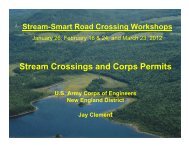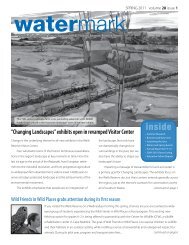Management Plan - National Estuarine Research Reserve System
Management Plan - National Estuarine Research Reserve System
Management Plan - National Estuarine Research Reserve System
Create successful ePaper yourself
Turn your PDF publications into a flip-book with our unique Google optimized e-Paper software.
◊when such entities conduct estuarine research;andConduct and coordinate estuarine researchwithin the <strong>System</strong>, gathering and makingavailable information necessary for improvedunderstanding and management of estuarineareas.The primary research objective for the NERR<strong>System</strong> is to study the causes and effects of naturaland anthropogenic change in the ecology ofestuarine and estuarine-like ecosystems. NOAA<strong>Estuarine</strong> <strong>Reserve</strong>s Division (ERD) research isdesigned to provide information of significant valueto the development and implementation of resourcemanagement policy governing U.S. coastal waters.ERD has identified five aspects of estuarine ecologicalchange to receive particular emphasis: non-pointsource pollution, habitat restoration, biodiversityand invasive species, sustaining resources withinestuarine ecosystems and socioeconomic research.<strong>System</strong>-wide <strong>Research</strong> FundingPrioritiesERD is a significant source of research fundingfor both independent and reserve staff researchers.Federal regulations (15 C.F.R. sec. 921.50 (a))specify that ERD research funds (under subpart Fof the regulations) are to be used primarily to:◊◊◊Support management-related research thatwill enhance scientific understanding of the<strong>Reserve</strong> ecosystem,Provide information needed by reserve managementand coastal management decisionmakers,andImprove public awareness and understandingof estuarine ecosystems and estuarine managementissues.Graduate <strong>Research</strong> FellowshipsIn 1997, the NOAA/<strong>Estuarine</strong> <strong>Reserve</strong>s Divisionbegan funding a competitive graduate researchfellowship program in the NERRS. The NERRSGraduate <strong>Research</strong> Fellowship Program (GRF) isintended to produce high quality research in thereserves focused on improving coastal zone managementwhile providing graduate students withhands-on experience in reserve research and monitoring.This fellowship provides graduate studentswith funding for 1 to 3 years to conduct their ownresearch projects and training in ecological monitoring.GRF projects must address coastal managementissues identified as having regional or nationalsignificance, relate them to the NERRS <strong>Research</strong>Priorities and be conducted at least partially withinone or more designated reserve sites.Students are asked to provide up to 15 hoursper week of research assistance to the reserve. Astudent’s individual GRF program is designed withon-site staff and may include on-site monitoring orresearch; this training may take place throughoutthe school year or may be concentrated during aspecific season.The Wells <strong>Reserve</strong> will continue to sponsorGraduate <strong>Research</strong> Fellows to the extent possible.Most fellows have been funded for 3 years, soopenings for new fellows at the <strong>Reserve</strong> may not beavailable in some years. The <strong>Research</strong> Coordinatorwill communicate regularly with the fellows, eitheras an informal project advisor or as a graduate committeemember.<strong>System</strong>-wide Phased MonitoringIt is the policy of the Wells <strong>Reserve</strong> to follow thePhased Monitoring plan initiated by the <strong>Estuarine</strong><strong>Reserve</strong>s Division in 1989, and as outlined in theNERRS Regulations and Strategic <strong>Plan</strong>:Phase I: Environmental Characterization, includingstudies necessary for inventory and comprehensivesite descriptions;Phase II: Site Profile, to include a synthesis of dataand information; andPhase III: Implementation of the <strong>System</strong>-wideMonitoring Program (SWMP).80 Wells <strong>National</strong> <strong>Estuarine</strong> <strong>Research</strong> <strong>Reserve</strong>




